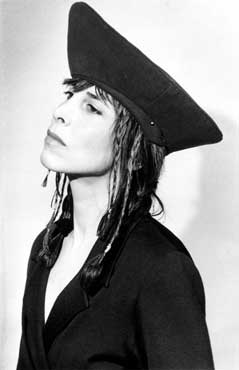Annette Peacock’s work is as a composer, vocalist, and pianist. It is austere and cryptic and laconic and minimalistic. Peacock’s dry delivery and preference for minimalist, stark musical “environments”, have made her a cult figure. Peacock, who was a participant in Dr. Timothy Leary’s psychedelic culture experiments (1961-1962), and a long-term adherent to Zen Macrobiotics since 1968, has released albums. Peacock’s career has been marked with long periods of silence, which partly explains her relative anonymity. Peacock is completely self-taught, with the exception of a short period at Juilliard in the 1970s. She was born in Brooklyn and began writing at the age of five. Albert Ayler was her first professional relationship. They toured Europe together in the 1960s. Soon, she began writing in an idiom she called the “free-form song”, which emphasizes space and contrasts with the chaotic, cacophonous tendencies in free jazz. She met and married Gary Peacock, a double bass player. She began writing material for Paul Bley, an avant-garde pianist, and his trio. Bley was her favorite interpreter for decades. Peacock is an unheralded pioneer in electronic music. Robert Moog, the inventor of synthesizers gave her a prototype years before their commercial emergence. She was inspired to create her own voice by Robert Moog, according to most reports. These experiments led to an innovative 1971 album called The Bley/Peacock Synthesizer. Peacock, despite her unconventional profile, has been in touch with mainstream culture on several occasions. She sang three songs on 1978’s Feels Good To Me, a minor rock classic by Bill Bruford. On the soundtrack to Kevin Smith’s 1997 film Chasing Amy, her song “My Mama Never Teach Me How To Cook” is included. A sample of Peacock’s “Survival”, which is featured in the Militant The Madd Rapper’s “Tell ‘Em Yu Madd” featuring Busta Rhymes, also appears. David Bowie, for example, has been interested in Peacock’s work throughout the years. The rock legend refers to Peacock’s song, “I’m not the One” on his album Hours in 1999. Bowie invited Peacock to join him. Marilyn Crispell, pianist, paid tribute to Peacock by playing an ECM disc entitled Nothing Ever Was Anyway: The Music Of Annette Peacock. Peacock’s guest performance was the end of a 12-year hiatus, her longest. Her official return to studio was in 2000, when she recorded her own An Acrobat’s Heart, also available on ECM. Peacock had never recorded before for the German-based label, despite many of her compositions appearing on Paul Bley’s ECM titles over the years. Allmusic
